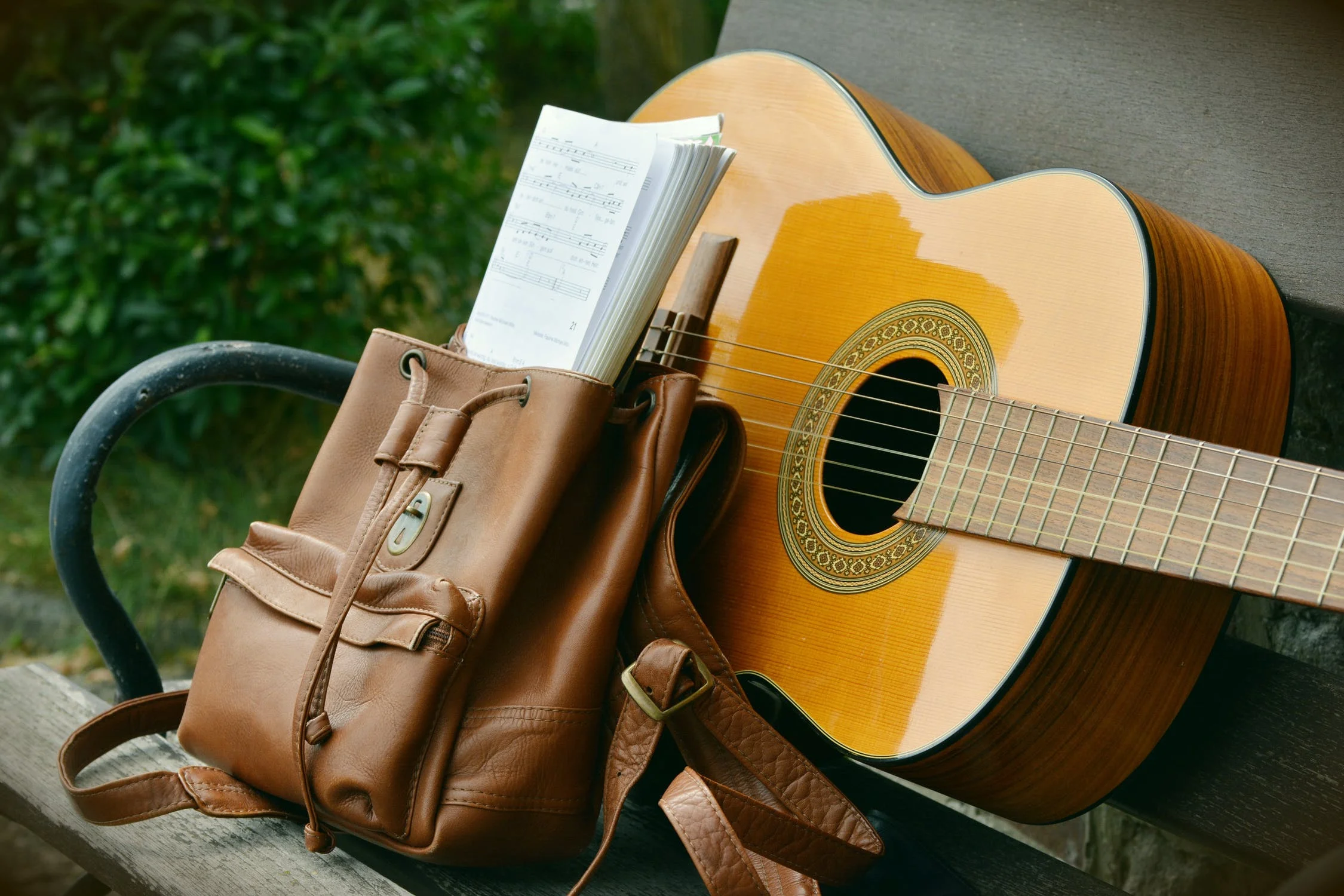Guitar
Guitar is the heart and soul of American popular music. The sound of the guitar shaped rock and roll and has been the definition of cool for generations of music fans! It’s expressive and exceedingly versatile; intimate acoustic ballads, rousing folk, street-beat soul and Rn’B, arena rock and screaming metal music, the guitar can and does do it all.
Ben just graduated from ukulele to guitar! We’re stoked about it.
Pros
Guitar can be used to play both melody (single notes) and harmony (multiple notes, or chords). It’s also a plectrum, or plucked instrument, giving it a percussive sound and a strong rhythmic element. Guitar players can generate a lot of intensity all by themselves. A guitar is equally suitable for lead and supporting roles, and feels at home both in and out of the spotlight.
Because it can generate rhythm and harmony and is played solely with the hands, it’s an ideal accompaniment instrument for the human voice. These features have shaped the development of guitar music throughout history and resulted in an enormous repertoire of songs with both instrumental and lyrical components. In other words, if you want to play and sing, guitar is a terrific choice!
Guitar is extremely portable, and acoustic guitars require no electricity. I’ve brought my guitar to music festivals, mountain tops, sandy beaches, and woodsy retreats. The sing-and-strum nature and relatively low volume of the guitar encourages audience participation more than any other instrument, and some of my fondest musical memories are of sitting around a campfire and playing and singing songs with friends.
No sheet music, and not much music theory required! Seriously, there are plenty of skilled guitar players out there who don’t read music or play scales at all. And while I absolutely advocate learning to play scales and read sheet music eventually, it’s not necessary to play guitar, and I teach many students with chord charts alone.
There is SO much great guitar music out there to learn and play!!!! Chances are good that one of your favorite songs was written or can at least be played on the guitar (as opposed to, say, the accordion); if you can play one, then you can probably play the music you love most!
COns
Guitar is physically difficult to play. Other instruments like piano and woodwinds have keys and buttons that are pretty easy to press. In contrast, you change the pitch of a guitar string by pressing it down with your fingers. Most people find this really challenging, and even painful at first! It gets a lot easier as time goes by, but can be frustrating for beginners.
Young children may not be able to play the guitar at all. Their hands might not be big enough to reach around the neck, and they usually lack the strength and coordination necessary to form guitar chords. In my experience, a child needs to be at least six years old and ideally seven or eight before they start guitar lessons.
Everyone plays guitar, and while that’s kinda cool, it makes things harder if you want to join a band or play paid gigs. There are usually more than enough guitar players in your neighborhood to go round, and the more of them there are, the less likely you are to get the job.
Not great for learning and understanding music theory. A guitar is basically a piano that’s been cut into six pieces and stacked on top of itself (my guitar teacher called them “Picasso Pianos”). You can learn a LOT of music on the guitar and still not really know what notes you’re playing, or why. It can be done, though!
Been there!
What to expect
Like most instruments, guitar is challenging at first. In some ways, though, it’s much more forgiving than piano or woodwinds, and the shorter learning curve means you’ll be playing songs you know and love, or even writing your own, a lot faster than you would on those instruments.
Guitars can be both incredibly cheap and ludicrously expensive! Try not to get sucked into either end of the price spectrum. Cheap guitars sound, well, cheap, and a $2000 guitar will probably sound a lot like a $400 guitar to you unless you really know what you’re listening for. For your first one, I’d suggest the Fender Squier, an affordable model from a reputable manufacturer. It’ll take the beginner a long way before they feel the need to upgrade.
Singing and playing simultaneously is tricky! If you’re like 99% of people on the planet, the first time you try it will be a real head scratcher. The human voice is a muscle like any other, and when we play music our brains don’t naturally separate it from what we’re doing with our hands. So, when we try to sing something, our hands involuntarily end up strumming at the same time, even when they’re not supposed to. It takes time and work to both sing and play, and initially it might not even seem possible. Fortunately, there are any number of exercises and techniques you can learn to build muscle independence, and a good teacher can get you there pretty fast.
Advice for parents: don’t buy your four year old a guitar! Seriously. They can’t play it. It’s bigger than them. And definitely don’t get them a child-sized guitar. These things aren’t much easier to play than a full-sized guitar and sound crummy, so steer clear of them. I strongly suggest buying your child a ukulele instead. Even a $40 one will sound pretty good, and uke is a terrific primer for guitar lessons.
Guitar is cool, fun to play, and not so difficult that you’ll get frustrated and let it collect dust. Seriously, it’s awesome. Go for it!





